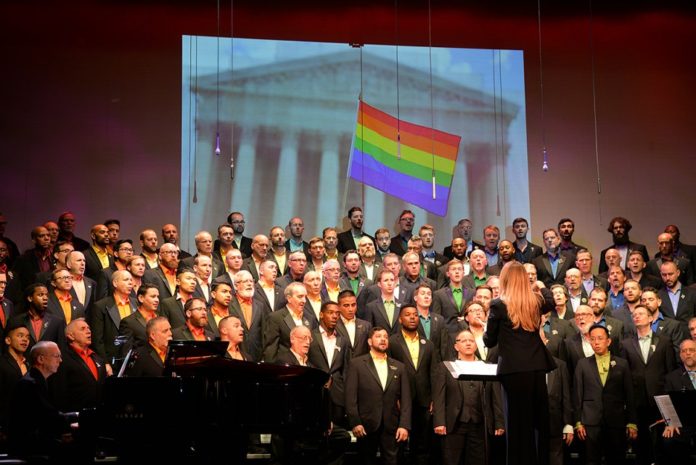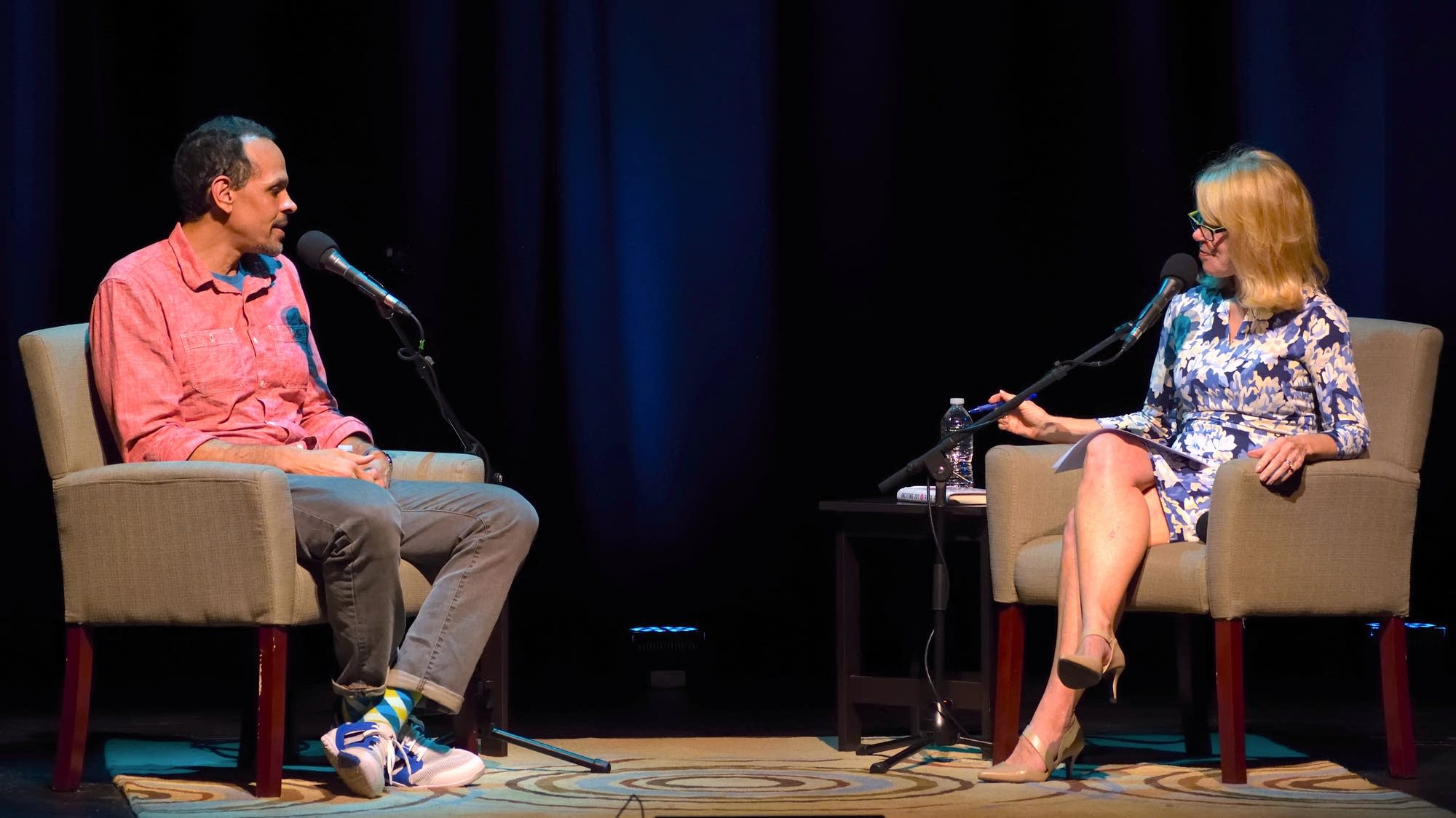
Jack Gerard has been hooked ever since he first signed up to sing with the Gay Men’s Chorus of Washington, a few months after the organization formed in 1981. “The chorus is just amazing for camaraderie and brotherhood, and the togetherness, and the harmony. You can just cry sometimes, it’s so pretty,” he says.
Gerard’s husband, Craig Arnold, also joined the chorus in its first year, equally drawn by the bonds that quickly formed among members. “It really felt like a family,” Arnold says. “And we formed friendships in the chorus that have lasted over the years.”
Friendships that have lasted — as well as deepened and evolved — just like that between Gerard and Arnold, who met in the chorus. “We were just friends back then,” says Arnold. “Jack had a boyfriend at the time. I had several.” They stayed in touch even after each retired from singing with the chorus, for different reasons, after six or seven years. “Jack and I would run into each other every now and then, not just at chorus functions, but other receptions and parties around town.” It wasn’t until 2013, after more than three decades of friendship, that the two decided to spring for something more. They tied the knot four years ago in June.
The two are among roughly 20 original members recognized today as Grande Dames of the Chorus, a designation reserved for people you could call first-year founders. It’s an honorific title, but it’s also a well-earned one, given what they all went through in the organization’s early years, as a deadly virus spread among the chorus and throughout the gay community.
“Members were dropping right and left from AIDS, and we were singing at memorials monthly it seemed,” Arnold says. “That was a very difficult time. We had already established our camaraderie and closeness as a family, and then to start losing people at that rate was just really tough.” The AIDS epidemic was arguably more impactful on the chorus than today’s COVID-19 pandemic. “The biggest difference is, in the beginning, AIDS had a stigma to it as the gay disease,” Arnold says. “With coronavirus, people are certainly nervous about it, but it doesn’t come with the same stigma attached.”
Another distinction is the fact that, at least to date, the chorus has not lost a single member to the coronavirus. “Thank God!” says Thea Kano, the chorus’s artistic director. “I do know some who did come down with it, but they are fine, thank God. And I was really concerned about that, obviously, being a large organization with 300-plus members in the area.” It helped that Kano made the last-minute decision to cancel the group’s Spring 2020 concert last March with only two days’ notice and hours before the first rehearsal, even as a number of members were already en route to the theater.
“Thank God we did that,” she says. “It could have been a different outcome, because, of course, singing, you’re totally spraying your aerosols 30-plus feet. And you can picture us all up there on stage, shoulder to shoulder. We dodged a bullet on that.”
As it happens, that’s just one of several causes for celebration at the chorus right now. The organization is turning 40 as well as thriving in virtually every way. “The biggest challenge for us was, ‘How do you represent 40 years of incredible history — both musically as well as the work we’ve done for social justice and equal rights,” Kano says. “How do you put that into a 90-minute video?”
Next Saturday, June 5, they’ll release what they devised in an ALS-interpreted production. The anniversary video GMCW Turns 40 concludes the chorus’s pandemic-necessitated all-virtual season, and represents “a complete turnabout from what we had envisioned at the Kennedy Center Concert Hall, where we traditionally celebrate our anniversary,” says Kano. The concert has been reimagined for smaller screens, putting to use the video-editing skills Kano and her team, including Craig Cipollini, have developed over the last year.
The video launches with a 10-minute montage of archival footage assembled by Cipollini highlighting some of the costumes as well as “little snippets of some solos and the chorus here and there, just to give you a scope of where we’ve been and how far we’ve come,” says Kano. The program also features what she calls two-minute “decade videos” interspersed throughout featuring “photos and clips and headlines from each decade that we’ve been around.”
Additionally, the chorus invited small groups of members to record themselves performing, while socially distanced and outdoors at various iconic locations in D.C. The result is performance footage taken everywhere from the steps of the Supreme Court to Black Lives Matter Plaza to what Kano refers to as “Amanda Gorman Alley,” the area just off 17th Street up from Floriana’s where a new, larger-than-life mural of the inspiring young Biden Inauguration poet towers.
“I am so grateful to our Grande Dames for being very much involved with this year in making sure that our entire history is celebrated and acknowledged,” Kano says. “It really has been so many people hands-on helping me to pull this together.”
At certain past anniversaries, Gerard and Arnold returned to sing a song or two, but they politely declined this time around. “We were offered the chance to sing by Zoom, [but] Jack and I both did not feel up to it,” Arnold says. “But this past year we’ve been very impressed with how the chorus has conducted themselves and had concerts online and streaming. Given all the technical work that goes into putting that together, I just can’t imagine how they get through rehearsals.”
Both are eager to finally see what the chorus has dreamt up for the anniversary video, fully confident it will be up to Kano’s impeccable standards — and yet more evidence that the next 40 years are off to a promising start.
“The programming has been phenomenal,” Arnold says. “As long as the chorus keeps coming up with new ways to present music and fresh ideas that relate to the audience, they will always be successful.”
“The chorus is thriving,” Gerard adds, praising everything from its financial health to its outreach efforts. “The fact that they’ve really made a hard effort to recruit these really talented young people in the last five years especially has just been amazing.”
GMCW Turns 40 begins streaming Saturday, June 5, at 7 p.m., and will be available for 72 hours after the first viewing, or until June 20. Tickets are $25. Visit www.gmcw.org.
Read More:
Drag ‘N Drive is coming to DC to help save 2021
Cruella review: A hyperbolic, hyperactive fashion fail
Leyna Bloom is ready for her closeup with trans romantic drama “Port Authority”








